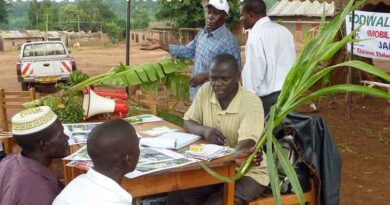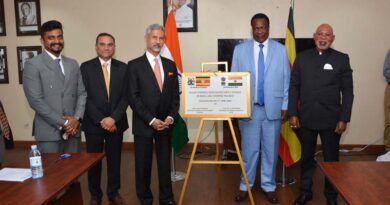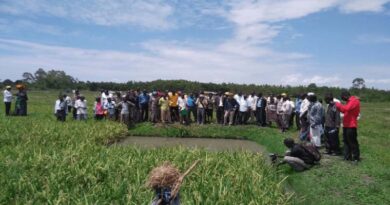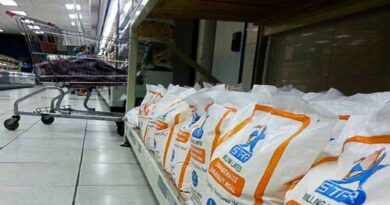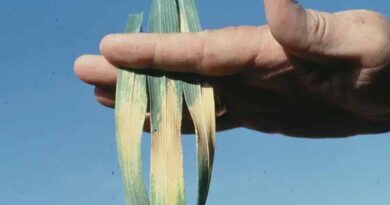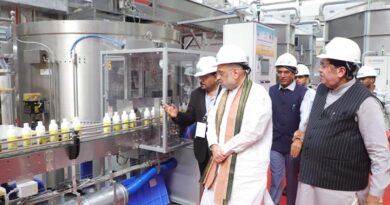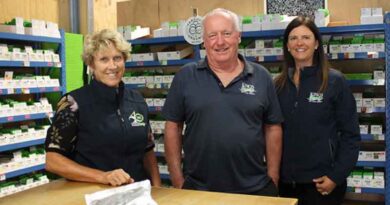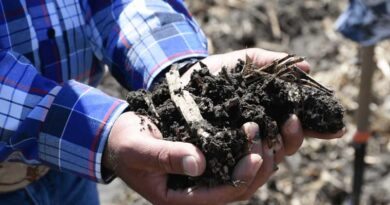Resilient Beans: Uganda’s Innovative Approach To Sustainable Coffee Farming
Contributor: Sara Lamsili, Jr Project Communications Manager
27 June 2024, Uganda: In the lush landscapes of Uganda where the rich aroma of coffee echoes through the spirit of its people, a transformative initiative is taking root. Against the backdrop of shifting climates, the Uganda Carbon and Coffee Project (UCCP) emerges as a beacon of resilience and sustainability. Sustainable development being a necessity, the project is weaving together the aspirations of smallholder farmers with the imperatives of environmental stewardship. From the Greater Ankole Region to the bustling markets brimming with potential, UCCP is embarking on a journey to reshape the future, one cup of coffee at a time.
Adapting to climate change and population growth, while including youth and women in the economy, are key priorities of Uganda’s development agenda (Ugandan Ministry of Local Development, 2022). Simultaneously, Uganda is one of the largest exporters of African coffee production. Coffee contributes to nearly a third of the country’s earnings from exports (World Coffee Research, 2021). It is essential to the livelihoods of over 1.7 million households in Uganda and these earnings pay for critical infrastructure such as roads, hospitals and schools.
As such, the UCCP is aimed at improving the livelihoods and climate resilience of smallholder coffee systems in Uganda. The beneficiary of this project is the Ankole Coffee Producers Cooperatives Union of (ACPCU) which comprises 32 cooperatives representing over 16,000 farmers in the Greater Ankole Region, located in South-Western Uganda. Beginning in April 2023 with a duration of at least 3 years, the project is multifaceted and unfolds across four distinct components. This project is conducted in partnership with APNI, OCP Foundation, the Uganda Coffee Development Authority, the National Agricultural Research Organization, Mohammed VI Polytechnic University, Environmental Conservation of Trust of Uganda, ECOTRUST, GrainPulse, and Makerere University.
Carbon Sequestration: Agroforestry’s Role in Climate Change Mitigation
At the core of this endeavour lies the first chapter: activating carbon finance to breathe a new economy into the coffee system that sustains livelihoods across the region. As smallholder farmers join UCCP they do more than plant crops. They also sow the seeds of environmental stewardship, harnessing the power of agroforestry to mitigate the impacts of climate change.
Over 3,000 smallholder farmers from the ACPCU umbrella coffee initiative are targeted to mobilize and plant over 900,000 trees on over 3,000 ha of land secured voluntarily from their farms over a 10 to 25-year rotational period. The intentional inclusion of trees into crops is known as agroforestry and fosters environmental, economic and social benefits. It helps to increase crop yields, build soil health, reduce soil erosion, and improve water quality. Planting trees on coffee fields also provides cooling shade from extreme rainfall and heat while allowing enough sunlight to pass through the leaves. Agroforestry also plays a role in the inclusion of youth and women into the workforce.
One of agroforestry’s main strengths resides in biological carbon sequestration which is the process of storing fixed carbon dioxide (CO2) in soils and trees, thus contributing to reduce greenhouse gas emissions and creating a carbon credit (Nair, et al., 2010). A carbon credit is generated based on how much CO2 is saved. Carbon credits can be used as financial incentives because they can be sold in the market and generate additional income from coffee production. This whole process is part of the green carbon finance mechanism (World Bank, 2022).
From Coffee Fields to Markets: Enhancing Productivity and Quality
The UCCP is focussed on empowering farmers by unlocking a new potential for productivity and quality through improved agronomy and diversification. From the sun-drenched fields to the buzzing markets, a symphony of innovation unveils as farmers embrace new techniques and technologies to enrich their harvests and their lives. The second component of this project focuses on improving coffee yields and incomes of smallholder coffee farmers through on-farm experimentation (OFE) complemented by the use of technology. This experimentation occurs in the farmer’s own field. The particularity of OFE lies in collaboration, peer-learning and experimentation, and scientists interacting directly with farmers. The smallholder farmers are at the central part of the experiments to ensure their involvement during the integrality of the process. (Lacoste, et al., 2021).
Several activities and approaches are involved such as peer-to-peer training where smallholders farmers who have successfully innovated on their farms share their expertise and lessons learned with their neighbours. Moreover, digital tools such as the Croppie App and the Farmer Logbook allow for coffee smallholders to use intuitive platforms in which they can document their observations, monitor and evaluate interventions, and get advice on how to improve the quality and quality of production. By the end of this project, thousands of farmers will be trained on coffee yield and quality improvement practices. This training will utilize a blend of expert-led approaches and promoter farmer-led coffee quality training at ACPCU’s Centre of Excellence.
Youth and Women: Driving Innovation in Uganda’s Coffee Sector through income diversification
As the project unfolds, the spotlight turns to Uganda’s vibrant youth. With 75% of the population under 35, their potential is boundless and is predicted to double in the next 25 years (UNICEF, 2015). Inclusion of youth in the production and marketing of diversified commodities fosters employment and entrepreneurship in rural areas. Youth leaders play an essential role in driving innovation and adopting new digital technologies.
While the primary focus of the project remains coffee, the inclusion of other products derived from apiculture and horticulture, for example, allows farmers to opportunity to experience new income diversification and avoid relying on a single commodity. This is particularly useful during times where coffee production may be scarce or reduced due to price fluctuations or climate-related risks. Early on, ACPCU farmers, most of them being women, have registered onto OnFarm Direct, an online platform dedicated to selling fresh products. A variety of fruits and vegetables have been sold already such as bananas, beans, cabbages, avocado, and maize.
Conclusion
By mobilizing smallholder farmers, leveraging innovative technologies, and fostering collaboration among various stakeholders, the UCCP endeavors to create sustainable and inclusive solutions that address the dual challenges of climate change adaptation and economic development. Through agroforestry initiatives, on-farm experimentation, market diversification, and rigorous assessment methodologies, the project aims to empower coffee farmers, enhance environmental sustainability, and contribute to the long-term resilience of Uganda’s coffee sector.
As the project progresses, it is crucial to maintain a focus on community engagement, capacity building, and knowledge sharing to ensure the sustainability of its interventions. By fostering partnerships, leveraging local expertise, and embracing adaptive management approaches, the UCCP has the potential to catalyze positive change within Uganda’s coffee industry while serving as a model for sustainable agriculture initiatives globally.
Also Read: Mancozeb Market Size to be Worth USD 2651.97 Million by 2032
(For Latest Agriculture News & Updates, follow Krishak Jagat on Google News)
(+80 Million Farming Audience Visits Krishak Jagat’s Hindi Website – Click Here for Website)


